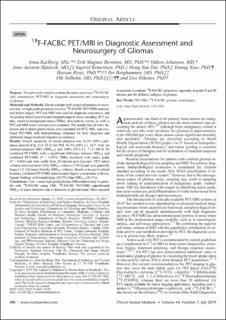| dc.contributor.author | Karlberg, Anna Maria | |
| dc.contributor.author | Berntsen, Erik Magnus | |
| dc.contributor.author | Johansen, Håkon | |
| dc.contributor.author | Skjulsvik, Anne Jarstein | |
| dc.contributor.author | Reinertsen, Ingerid | |
| dc.contributor.author | Hong, Yan Dai | |
| dc.contributor.author | Xiao, Yiming | |
| dc.contributor.author | Rivaz, Hassan | |
| dc.contributor.author | Borghammer, Per | |
| dc.contributor.author | Solheim, Ole | |
| dc.contributor.author | Eikenes, Live | |
| dc.date.accessioned | 2021-01-05T12:56:21Z | |
| dc.date.available | 2021-01-05T12:56:21Z | |
| dc.date.created | 2019-07-09T08:35:25Z | |
| dc.date.issued | 2019 | |
| dc.identifier.citation | Clinical Nuclear Medicine. 2019, 44 (7), 550-559. | en_US |
| dc.identifier.issn | 0363-9762 | |
| dc.identifier.uri | https://hdl.handle.net/11250/2721496 | |
| dc.description.abstract | Purpose: This pilot study aimed to evaluate the amino acid tracer 18F-FACBC
with simultaneous PET/MRI in diagnostic assessment and neurosurgery
of gliomas.
Materials and Methods: Eleven patients with suspected primary or recurrent low- or high-grade glioma received an 18F-FACBC PET/MRI examination before surgery. PET and MRI were used for diagnostic assessment, and
for guiding tumor resection and histopathological tissue sampling. PET uptake, tumor-to-background ratios (TBRs), time-activity curves, as well as
PET and MRI tumor volumes were evaluated. The sensitivities of lesion detection and to detect glioma tissue were calculated for PET, MRI, and combined PET/MRI with histopathology (biopsies for final diagnosis and
additional image-localized biopsies) as reference.
Results: Overall sensitivity for lesion detection was 54.5% (95% confidence interval [CI], 23.4–83.3) for PET, 45.5% (95% CI, 16.7–76.6) for
contrast-enhanced MRI (MRICE), and 100% (95% CI, 71.5–100.0) for
combined PET/MRI, with a significant difference between MRICE and
combined PET/MRI (P = 0.031). TBRs increased with tumor grade
(P = 0.004) and were stable from 10 minutes post injection. PET tumor
volumes enclosed most of the MRICE volumes (>98%) and were generally
larger (1.5–2.8 times) than the MRICE volumes. Based on image-localized
biopsies, combined PET/MRI demonstrated higher concurrence with malignant findings at histopathology (89.5%) than MRICE (26.3%).
Conclusions: Low- versus high-grade glioma differentiation may be possible with 18F-FACBC using TBR. 18F-FACBC PET/MRI outperformed
MRICE in lesion detection and in detection of glioma tissue. More research
is required to evaluate 18F-FACBC properties, especially in grade II and III
tumors, and for different subtypes of gliomas. | en_US |
| dc.language.iso | eng | en_US |
| dc.publisher | Lippincott, Williams & Wilkins | en_US |
| dc.rights | Attribution-NonCommercial-NoDerivatives 4.0 Internasjonal | * |
| dc.rights.uri | http://creativecommons.org/licenses/by-nc-nd/4.0/deed.no | * |
| dc.subject | PET/MRI | en_US |
| dc.subject | 18F-FACBC | en_US |
| dc.subject | glioma | en_US |
| dc.subject | Neurosurgery | en_US |
| dc.title | 18F-FACBC PET/MRI in diagnostic assessment and neurosurgery of gliomas | en_US |
| dc.type | Peer reviewed | en_US |
| dc.type | Journal article | en_US |
| dc.description.version | publishedVersion | en_US |
| dc.rights.holder | © 2019 The Author(s). Published by Wolters Kluwer Health, Inc. This is an open-access article distributed under the terms of the Creative Commons Attribution-Non Commercial-No Derivatives License 4.0 (CCBY-NC-ND), where it is permissible to download and share the work provided it is properly cited. The work cannot be changed in any way or used commercially without permission from the journal. | en_US |
| dc.source.pagenumber | 550-559 | en_US |
| dc.source.volume | 44 | en_US |
| dc.source.journal | Clinical Nuclear Medicine | en_US |
| dc.source.issue | 7 | en_US |
| dc.identifier.doi | 10.1097/RLU.0000000000002610 | |
| dc.identifier.cristin | 1710731 | |
| cristin.unitcode | 7401,90,25,0 | |
| cristin.unitname | Helse | |
| cristin.ispublished | true | |
| cristin.fulltext | original | |
| cristin.qualitycode | 1 | |

